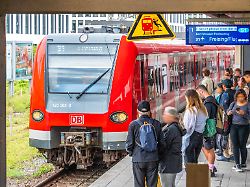“No clear signal from the federal government”
NRW Transport Minister fears the end of the Deutschlandticket
September 24, 2023, 6:30 a.m
Listen to article
This audio version was artificially generated. More info | Send feedback
Around ten million people use the Deutschlandticket on nationwide local transport. Now the chairman of the conference of transport ministers of the federal states warns: The offer could quickly be history again. So far, the federal and state governments have not agreed on further financing.
Because of the financial dispute with the federal government, North Rhine-Westphalia Transport Minister Oliver Krischer from the Greens has warned against the end of the Deutschlandticket. “If a solution is not found for the Deutschlandticket very quickly, then what we all rightly celebrate as the most successful ticket model in public transport history and which is really a huge step forward will quickly be history again,” said the chairman the conference of transport ministers of the federal states. He also called for federal approval for a nationwide semester ticket.
On Thursday there will be a special digital meeting of the conference of federal and state transport ministers. The aim there is to coordinate a common position between the states and talk to the federal government about the situation, said Krischer. Federal Transport Minister Volker Wissing was of course also invited. “We have not yet received an acceptance or rejection,” said the Green politician.
Future financing open
Since May 1st, the Deutschlandticket can be used for buses and trains in local and regional transport for 49 euros per month, as a digitally bookable, monthly-cancelable subscription throughout Germany. The federal and state governments are each giving 1.5 billion euros by 2025. In the first year, possible additional costs should be shared in half – but this “additional payment obligation” is open from 2024. Krischer therefore spoke of a difficult financial situation. “It is not clear whether the federal government will contribute to all costs.” However, the obligation to make additional contributions is necessary because local transport companies have to have a basis from which to calculate.
“We as states are prepared to pay half of the additional costs. However, there is no clear signal from the federal government, but on the contrary a hardening.” He takes from Wissing’s statements that there should not be a single euro from the federal government. “Then of course we are facing a difficult future with the Deutschlandticket.” The NRW Ministry of Transport considers the Association of German Transport Companies’ forecast of additional costs of 1.1 billion euros in 2024 to be realistic. The solution must be that the federal and state governments continue to share the additional costs equally, emphasized Minister Krischer.
What could a solution look like?
If the federal government continues with its “blockade stance”, three scenarios are conceivable: “One possibility is to increase the price. There is already a figure in the room, namely 59 euros. You could do that. But I think so politically it would be fatal if you had such an increase less than a year after its introduction. That wouldn’t help us in this matter either. If you make the ticket ten euros more expensive, then people will drop out again and the income won’t be much in the end be higher. That means a price increase is not a solution,” said Krischer.
“The second solution is for the states to say that we will cover the additional costs alone. But I don’t see any political acceptance among the states. The third option would be to reduce the supply in order to save costs. But that contradicts pretty much every transport policy program .”
“Deutsche Bahn is a huge problem”
In response to Wissing’s request to save on sales costs in public transport and to reduce the number of transport associations, the Green politician said that this would not begin to solve the financing problems in public transport and the Deutschlandticket. “A huge problem we have in public transport is Deutsche Bahn. And that is a structural problem,” Krischer added. He would like Wissing to take care of his structural problems. “Then we would already have made progress in many areas. There is no need for clever advice to the countries.”
The Conference of Transport Ministers in Aachen in the spring made a proposal for a nationwide semester ticket for 29.60 euros per month, said Krischer. “This allows us to maintain this distance through the solidarity model.” But the federal government has not reacted for months. “This is even more incomprehensible because it costs nothing more to introduce such a nationwide semester ticket. On the contrary, it is a relief because we are keeping this large group of around three million students in the system.” Due to the joint financing, the states would need the federal government’s approval.
